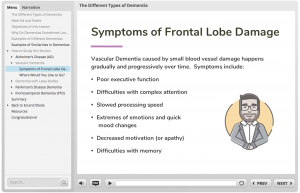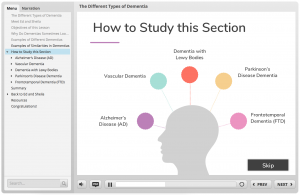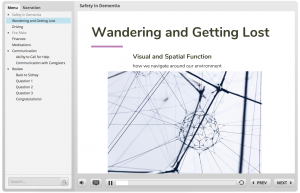Receiving a diagnosis like dementia is often overwhelming for patients and their families. It’s nearly impossible for healthcare professionals to provide all the information a patient would want to know in just one session.

Dr. Richard Sztramko
“As a clinician, it’s frustrating seeing patients for an hour or more, coming up with a diagnosis and then having only 20 minutes to teach them everything they possibly need to know about dementia,” says Dr. Richard Sztramko, a Hamilton-based geriatrician.
Dr. Sztramko realized there was a sizeable gap when it comes to patient and caregiver education. According to him, what’s provided to the patient during an initial diagnosis often isn’t enough. And while the web has a ton of information, it can be very misleading. “When patients go off into the internet, they’re exposed to so much information – a lot of it isn’t necessarily directly applicable to where they’re at in the current stage of the disease.”
Collaboration with CABHI
That’s the main reason the geriatrician and his team at the Division of eLearning Innovation at McMaster and the GERAS Centre are developing iGeriCare – an online platform for people who are newly diagnosed with dementia, along with their families, to access relevant information at their own pace.

The e-learning modules cater to the patient’s stage and type of dementia
“There’s certainly a lot of educational material out there,” admits Dr. Sztramko. “But we did a needs assessment at our clinic and a big thing that the patients wanted was something that they knew they could trust. And so there might be lots of high-quality educational material out there, but how do you know you can trust it? And how do you know that it’s right?”
Dr. Sztramko applied for Spark, a program launched by the Baycrest-led Centre for Aging + Brain Health Innovation (CABHI), designed to nurture early-stage ideas from point-of-care clinicians. CABHI provides up to $50,000 in financial support, plus guidance and feedback opportunities.
“The Spark catalyst is really what started everything,” shares Dr. Sztramko. “Once we got that award, everybody else seemed to jump on board and get really excited about iGeriCare. We used the money to build out the project, but also acquire human resources – it’s been extremely helpful.”
He adds that the ability to maintain academic freedom and intellectual property is another key benefit to collaborating with CABHI.
The project has been heavily supported by Dr. Alexandra Papaioannou and the GERAS Centre, as well as Dr. Anthony Levinson and the Division of eLearning Innovation at McMaster.
How iGeriCare looks
iGeriCare isn’t a one-size-fits all resource. There are different evidence-informed modules based on the patient and caregiver’s unique needs. “So if they’ve just been diagnosed, it might be, ‘What is dementia?’ Or if they’re really advanced, it might be dealing with behavioural and psychiatric issues.”

Users are supported with instructions throughout the e-lerning modules
The modules include a number of elements such as videos, diagrams and clinical vignettes. “This is a story; this is somebody’s narrative,” adds Dr. Sztramko. “It’s always bringing it back to clinical vignettes that we see everyday. When people read it they can relate to the person that’s experiencing these things.”
Dr. Sztramko is developing iGeriCare with the input of other geriatricians, clinical staff and a group that he calls “super users” – people such as Ruth Simmons, who have experienced caregiving first hand.
“If I were backing up several years and was in the middle of my family member’s crises with Alzheimer’s, I would find this very helpful…” shares Ruth, a caregiver who has used some of the iGeriCare modules and provided feedback. “This program would be very useful as it is not stressful to use. I was very happy and satisfied because [the lesson] sort of reviewed what I had experienced.”
Dr. Sztramko hopes to follow up the initial project with one that focuses on fostering an online community. “So instead of just going to a chat room on the web, and again not being able to trust what people say, people will be able to communicate with one another. They’ll be able to find resources outside of the modules,” he says, adding that the team is building Facebook Live and YouTube Live capabilities into the iGeriCare platform.
According to Dr. Sztramko, the information itself is only one piece of the puzzle. “It’s not just the information, it’s how it’s presented. iGeriCare focuses on narrative-based medicine and providing that personal touch and connection.”
Next steps
Through the support leveraged from CABHI’s Spark Program, Dr. Sztramko’s team recruited a group of 15 patients and caregivers who trialed the platform for periods of up to six months.

One of the modules focuses on safety
More recently, iGeriCare received additional funding through CABHI’s Researcher-Clinician Partnership Program (RCP2), which will help to accelerate their innovation even further. The RCP2 program connects point-of-care clinicians like Dr. Sztramko with university-based researchers to test and validate their product in real-world care settings. CABHI’s additional RCP2 support will allow Dr. Sztramko and his team to refine and enhance the platform and actually test it out in multiple clinical sites.
“In our most recent release to the public we had over 600 people view our website, with the large majority suggesting they would actively promote our platform,” says Dr. Sztramko. “We are actively engaging community partners and home care providers to get our platform out to as many people as possible.”
“The caregivers and clinicians that have seen iGeriCare so far have given extremely positive reviews,” he adds. “We look forward to trying to make a positive impact on the lives of caregivers across Canada and hopefully beyond.”
Learn more about Spark and our current slate of projects.


